一般疑问句和否定句精编版
一般疑问句的肯定回答和否定回答例子
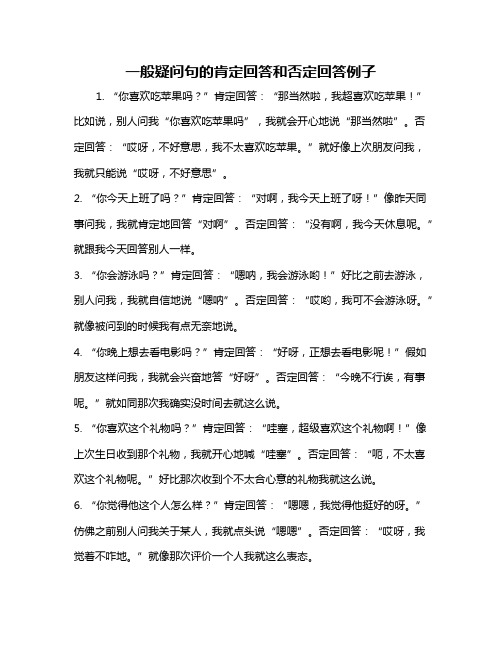
一般疑问句的肯定回答和否定回答例子1. “你喜欢吃苹果吗?”肯定回答:“那当然啦,我超喜欢吃苹果!”比如说,别人问我“你喜欢吃苹果吗”,我就会开心地说“那当然啦”。
否定回答:“哎呀,不好意思,我不太喜欢吃苹果。
”就好像上次朋友问我,我就只能说“哎呀,不好意思”。
2. “你今天上班了吗?”肯定回答:“对啊,我今天上班了呀!”像昨天同事问我,我就肯定地回答“对啊”。
否定回答:“没有啊,我今天休息呢。
”就跟我今天回答别人一样。
3. “你会游泳吗?”肯定回答:“嗯呐,我会游泳哟!”好比之前去游泳,别人问我,我就自信地说“嗯呐”。
否定回答:“哎哟,我可不会游泳呀。
”就像被问到的时候我有点无奈地说。
4. “你晚上想去看电影吗?”肯定回答:“好呀,正想去看电影呢!”假如朋友这样问我,我就会兴奋地答“好呀”。
否定回答:“今晚不行诶,有事呢。
”就如同那次我确实没时间去就这么说。
5. “你喜欢这个礼物吗?”肯定回答:“哇塞,超级喜欢这个礼物啊!”像上次生日收到那个礼物,我就开心地喊“哇塞”。
否定回答:“呃,不太喜欢这个礼物呢。
”好比那次收到个不太合心意的礼物我就这么说。
6. “你觉得他这个人怎么样?”肯定回答:“嗯嗯,我觉得他挺好的呀。
”仿佛之前别人问我关于某人,我就点头说“嗯嗯”。
否定回答:“哎呀,我觉着不咋地。
”就像那次评价一个人我就这么表态。
7. “你能帮我一下吗?”肯定回答:“行啊,没问题,我来帮你!”上次有人这么问我,我就爽快地说“行啊”。
否定回答:“不好意思哈,这会儿没空呢。
”就和那次我有些为难时说的一样。
8. “你养狗了吗?”肯定回答:“养啦,我养了一只超可爱的狗!”就像别人好奇问我时我骄傲地说。
否定回答:“没养呀,还没这个打算呢。
”好像那次我就是这么回应的。
我的观点结论就是:一般疑问句的回答真的很简单直接,有时候一句话就能表达清楚我们的态度和情况呢!。
一般疑问句,否定句以及对划线部分提问的答题方法[1]
![一般疑问句,否定句以及对划线部分提问的答题方法[1]](https://img.taocdn.com/s3/m/4ead43cd9b89680203d8255b.png)
一般疑问句,否定句以及对划线部分提问的答题方法改为一般疑问句:1.先找am, is, are, was, were或can, would,放在最前面2.如果没有am, is, are, was, were或can, would,则看动词:(1)动词是过去式,句前加Did,动词变原形,其余照抄;(2)动词是第三人称单数,句前加Does,动词变原形,其余照抄。
(3)动词是原形,则句前加Do,其余照抄。
改为否定句:1.方法和上面一样,先找am, is, are, was, were或can, would,再后加not,其余照抄;2.如果没有am, is, are, was, were或can, would,则看动词:(1)动词为过去式,人后加didn’t,动词变原形,其余照抄;(2)动词为第三人称单数,人后加does n’t, 动词改为原形,其余照抄。
(3)动词为原形,则人后加don’t,其余照抄对划线部分提问:1.用适当的疑问词代替划线部分2.将剩余部分改为一般疑问句(注:如划线部分为主语,则用who代替,其余照抄;如划线部分为动词或动词短语,则用do代替,句前加what,再改为一般疑问句。
)学习小贴士:1.在be动词(is, am, are, was, were)或情态动词(can, may, must, should, would, could)后面加not,可以缩写成n’t. (情态动词后面动词用原形)如:I am a student. → I am not a student. (am not不能缩写)They are on the desk. → They are not on the desk.(are not = aren’t)2.在动词前加don’t, doesn’t, didn’t如:I have a pen.→ I don’t have a pen.She likes watching TV.→ She doesn’t like watch TV.(doesn’t后面用动词原形)We went to the park yesterday.→ We didn’t go to school yesterday. (didn’t 后面用动词原形) 3.祈使句的否定形式在句首在Don’t如: Open the door.→ Don’t open the door. (注意Don’t后面的单词开头字母不要大写)注:在改否定句时,如果句子中有some要改成any如:There are some birds in the tree.→ There aren’t any birds in the tree改一般问句和否定句要注意:☆ some 要变成 any如: There are some toys on the bed.→Are there any toys on the bed?☆第一人称(我)要与第二人称(你)互换如: I am at school now.→ Are you at school now? ( I 要变成you,所以be动词改成are)My father likes reading magazines.→ Does your father like reading magazines?对划线部分提问要注意:根据划线内容找出相对应的疑问词how和wh-词(what, when, where等),后面如有be动词或情态动词就跟be动词或情态动词,没有be动词或情态动词,后加do/does/did,划线部分的内容在问句中不出现。
Do_的四种用法精编版

助动词的用法一、助动词do的用法在英语中,助动词本身没有意义,只是帮助实义动词完成某些语法功能,如构成否定句、疑问句、简略答语等。
do 有两种形式原形现在时第三人称单数do的基本用法:构成否定句构成一般疑问句及回答构成特殊疑问句1.原形肯定式: do否定式: do not缩略否定式: don’t用法:do用在第一人称单复数(I,we…)、第二人称单复数(you…)和第三人称复数(they…)做主语,且时态为一般现在时的句子中,构成否定句、一般疑问句及回答、特殊疑问句。
Examples:I like this red hat. 我喜欢这顶红色的帽子。
否定句:我不喜欢这顶红色的帽子。
I don’t like this red hat.一般疑问句及回答:你喜欢这顶红色的帽子吗?是的,我喜欢。
∕不,我不喜欢。
Do you like this red hat?Yes, I do./ No, I don’t.特殊疑问句: 你喜欢哪一顶帽子?Which hat do you like?Lily and I want to go to Beijing.莉莉和我想去北京。
否定句: Lily and I don't want to go to Beijing.莉莉和我不想去北京。
一般疑问句及回答:Do Lily and you want to go to Beijing?Yes, we do. ∕No, we don't.莉莉和你想去北京吗?是的,我们想去。
∕不,我们不想去。
特殊疑问句:Where do Lily and you want to go?莉莉和你想去哪儿?练习:1、我不喜欢狗。
Idon't like dogs.2、你喜欢什么颜色?What color do you like?3、你有词典吗?是的,我有。
Do you have a dictionary?Yes, I do.2.现在式第三人称单数肯定式: does否定式: does not缩略否定式:doesn’t用法:does用在第三人称单数做主语,且时态为一般现在时的句子中。
否定句及一般疑问句
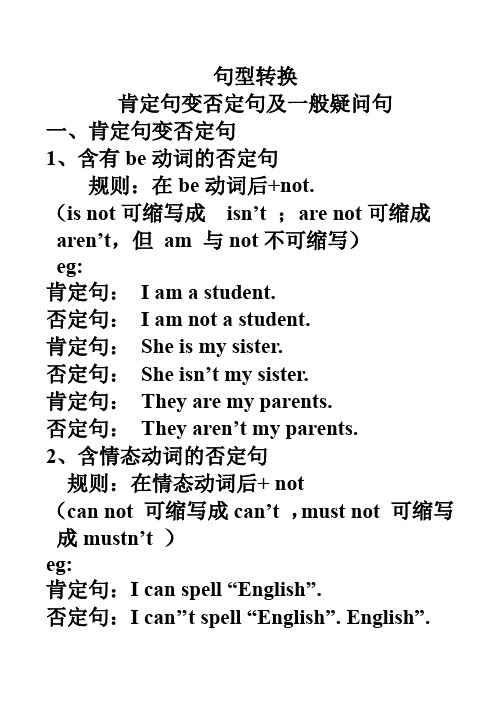
句型转换肯定句变否定句及一般疑问句一、肯定句变否定句1、含有be动词的否定句规则:在be动词后+not.(is not可缩写成isn’t ;are not可缩成aren’t,但am 与not不可缩写)eg:肯定句:I am a student.否定句:I am not a student.肯定句:She is my sister.否定句:She isn’t my sister.肯定句:They are my parents.否定句:They aren’t my parents.2、含情态动词的否定句规则:在情态动词后+ not(can not 可缩写成can’t ,must not 可缩写成mustn’t )eg:肯定句:I can spell “English”.否定句:I can’’t spell “English”.English”.肯定句:I must find it.否定句:I mustn’t find it.3、含有实义动词的句子的否定句构成(1)第三人称单数做主语。
(he、she、it或表示单个人或物的第三人称名词)规则:要在行为动词前加上助动词doesn’t,然后将动词恢复原形。
eg :肯定句:He has a soccer ball.否定句:He doesn’t have a soccer ball.(2)其它人称做主语规则:在行为动词前加don’t ,句子中的行为动词用原形。
eg:肯定句:They like bananas.否定句:They don’t like bananas.注:(1)在变否定句时,如遇some应变any Here are some books.Here aren’t any books.二、肯定句变一般疑问句1、含有be动词的句子变一般疑问句规则:把be动词提至句首,第一人称变第二人称,句末句号变问号。
(I/we变成youMy/our变成your)肯定句:I am a student.一般疑问句:Are you a student?肯定句:She is my sister.一般疑问句:Is she your sister?肯定句:They are my parents.一般疑问句:Are they your parents?2、含有情态动词的句子变一般疑问句规则:把情态动词提至句首,第一人称变第二人称,句末句号变问号。
句子改写-否定句和一般疑问句

句子改写——否定句、一般疑问句1. It is a big tiger.否定句____________________________一般疑问句2.We are sitting under the tree.否定句____________________________一般疑问句3.Mike and David are my cousins.否定句____________________________一般疑问句4.There is some milk in the glass.否定句____________________________一般疑问句5. There are some buses in the street.否定句____________________________一般疑问句6.I am having lunch in the kitchen.否定句____________________________一般疑问句7.We are playing the guitar on Sundays.否定句____________________________一般疑问句8.They are watching TV.否定句____________________________一般疑问句9.I can play the piano.否定句____________________________一般疑问句10.S he can make a nice cake.否定句____________________________一般疑问句11.They can go shopping on Saturdays.否定句____________________________一般疑问句12.I often play football after school.否定句____________________________一般疑问句13.They go to bed at 9:30.否定句____________________________一般疑问句14.I have a nice toy.否定句____________________________一般疑问句15.We like drawing.否定句____________________________一般疑问句16.I do my homework after school.否定句____________________________一般疑问句17.H e likes swimming.否定句____________________________一般疑问句18.S he likes listening to the radio.否定句____________________________一般疑问句19. Tom goes to school on Monday.否定句____________________________一般疑问句20. Sam does his homework every day.否定句____________________________一般疑问句21. My mum washes clothes every day. 否定句____________________________一般疑问句22. He usually has lunch at school.否定句____________________________一般疑问句23. I went to Shanghai last year.否定句____________________________一般疑问句24. We played soccer yesterday.否定句____________________________一般疑问句25. He saw a tall giraffe last Sunday.否定句____________________________一般疑问句26.H e gave me a lot of new books.否定句____________________________ 一般疑问句。
一般现在时的否定句和疑问句
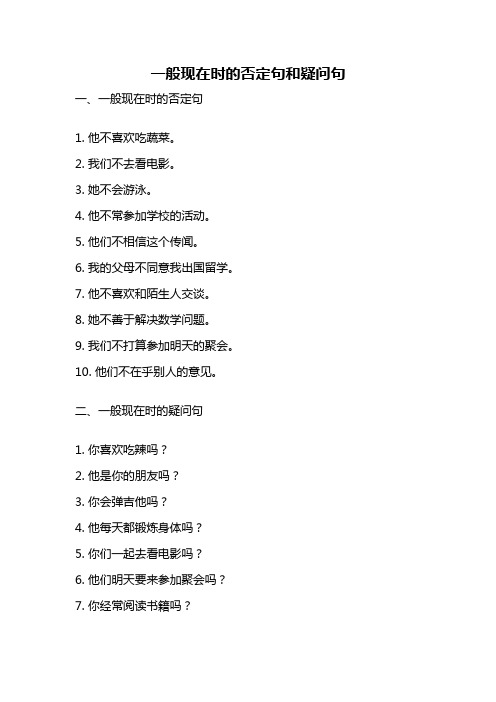
一般现在时的否定句和疑问句一、一般现在时的否定句1. 他不喜欢吃蔬菜。
2. 我们不去看电影。
3. 她不会游泳。
4. 他不常参加学校的活动。
5. 他们不相信这个传闻。
6. 我的父母不同意我出国留学。
7. 他不喜欢和陌生人交谈。
8. 她不善于解决数学问题。
9. 我们不打算参加明天的聚会。
10. 他们不在乎别人的意见。
二、一般现在时的疑问句1. 你喜欢吃辣吗?2. 他是你的朋友吗?3. 你会弹吉他吗?4. 他每天都锻炼身体吗?5. 你们一起去看电影吗?6. 他们明天要来参加聚会吗?7. 你经常阅读书籍吗?8. 你们喜欢听音乐吗?9. 他们在学校里表现好吗?10. 你会游泳吗?三、一般现在时的否定疑问句1. 你不喜欢吃辣吗?2. 他不是你的朋友吗?3. 你不会弹吉他吗?4. 他每天都不锻炼身体吗?5. 你们不一起去看电影吗?6. 他们明天不来参加聚会吗?7. 你不经常阅读书籍吗?8. 你们不喜欢听音乐吗?9. 他们在学校里表现不好吗?10. 你不会游泳吗?四、一般现在时的特殊疑问句1. 你在做什么?2. 你为什么不喜欢吃蔬菜?3. 他在哪里工作?4. 你们什么时候去看电影?5. 他们为什么不相信这个传闻?6. 你的父母同意你出国留学吗?7. 他为什么不喜欢和陌生人交谈?8. 她怎样解决数学问题?9. 你们明天要参加什么活动?10. 他们在乎别人的意见吗?五、一般现在时的选择疑问句1. 你喜欢喝茶还是咖啡?2. 你是喜欢狗还是猫?3. 你更喜欢阅读小说还是看电影?4. 你愿意去旅行,还是宅在家里?5. 你更喜欢夏天还是冬天?6. 你是喜欢吃甜食还是咸食?7. 你更喜欢听音乐还是看电视剧?8. 你愿意去海边还是山上度假?9. 你是喜欢运动还是宅在家里?10. 你更喜欢喝果汁还是牛奶?。
(完整版)小学英语四种基本句型肯定句否定句、一般疑问句与特殊疑问句
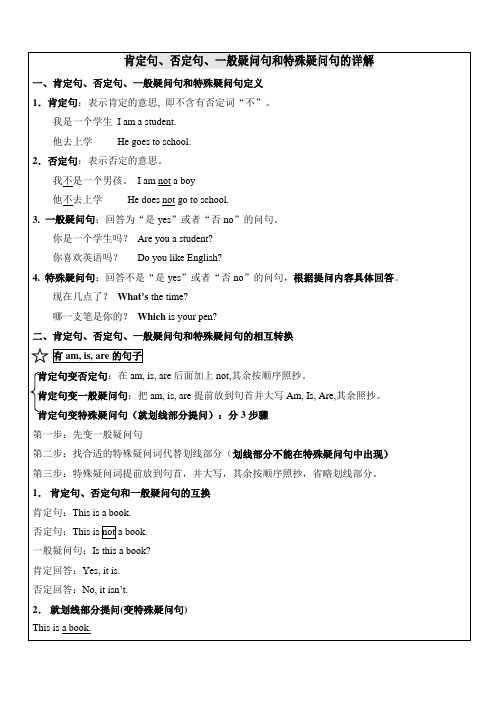
类别 陈述句
疑问句
用法
标点
肯定 叙述一件事情或
说明说话人的看法
.
否定
一般 用于提出问题
?
特殊 用于提出问题
?
选择
用于提出问题
?
反意
用于提出问题
?
例句 This is a bag. That's my book. I can see a bag over there. I don't know. Are you a student? Do you like puppets? Can you speak English? What's your name? Where's my bag? How many trees are there?
Is your friend a boy or a girl?
It's a fine day, isn't it?
祈使句 感叹句
特殊:
表示命令或请求、建议
表示惊讶\赞美\愤怒 等强烈情感
.或! !
Put it here! Look at the noticeboard.
How smart! Glad to see you! What a nice pencil case!
why 为什么 问原因 what 什么 问东西 what time 什么时间 问时间 what colour 什么颜色 问颜色 what about…怎么样 问意见 what day 星期几 问星期
三.句子的种类
how much 多少 问价钱 how about …怎么样 问意见 how far 多远 问路程 how long 多长 问时间 How soon 多快,多久 问时间 How often 多久 问频率
(完整版)小学英语一般疑问句、否定句和特殊疑问(附习题)(可编辑修改word版)
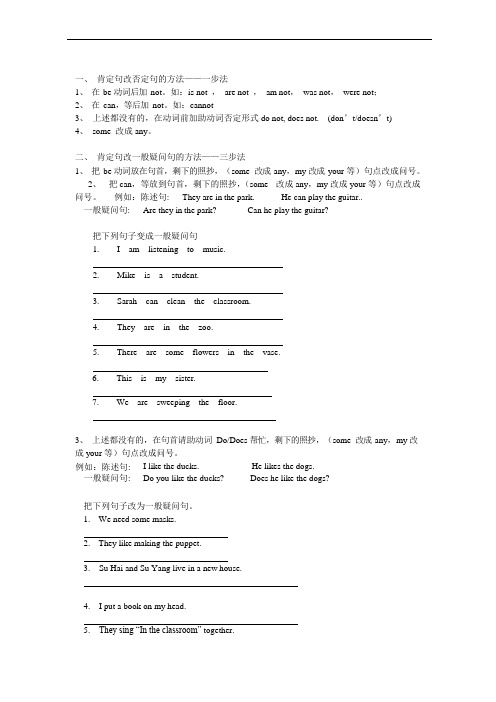
一、肯定句改否定句的方法——一步法1、在be 动词后加not。
如:is not ,are not ,am not,was not,were not;2、在can,等后加not。
如:cannot3、上述都没有的,在动词前加助动词否定形式do not, does not. (don’t/doesn’t)4、some 改成any。
二、肯定句改一般疑问句的方法——三步法1、把be 动词放在句首,剩下的照抄,(some 改成any,my 改成your 等)句点改成问号。
2、把can,等放到句首,剩下的照抄,(some 改成any,my 改成your 等)句点改成问号。
例如:陈述句: They are in the park. He can play the guitar..一般疑问句: Are they in the park? Can he play the guitar?把下列句子变成一般疑问句1. I am listening to music.2. Mike is a student.3. Sarah can clean the classroom.4. They are in the zoo.5. There are some flowers in the vase.6.This is my sister.7.We are sweeping the floor.3、上述都没有的,在句首请助动词Do/Does 帮忙,剩下的照抄,(some 改成any,my 改成your 等)句点改成问号。
例如:陈述句: I like the ducks. He likes the dogs.一般疑问句: Do you like the ducks? Does he like the dogs?把下列句子改为一般疑问句。
1.We need some masks.2.They like making the puppet.3.Su Hai and Su Yang live in a new house.4.I put a book on my head.5.They sing “In the classroom” together.6.We play basketball on Sundays.7.Tom likes listening to music三、肯定句改特殊疑问句的方法——四步法1、在一般疑问句的基础上,句首添加一个疑问词即可,可根据划线部分确定是什么疑问词。
怎样变一般疑问句和否定句

4. I have a bag . _D_o__y_o_u__h_a_v_e__a_b_a_g_?__________________________
2.)has 旳一般疑问句: a. He has a soccer ball .(变一般疑问句)
Does he have a soccer ball ? b. She has a ping-pang bat . (变一般疑问句)
Does she a have ping-pang bat ?
c. Jane has a tennis racket . (变一般疑问句)
I am a boy.----------- Are you a boy?
二.have/has旳一般疑问句:
1.)have 旳一般疑问句: a. I have a book .(变一般疑问句)
Do you have a book ? b. They have many books . (变一般疑问句)
b. They have many books . (变一般否定句)
They don’t have many books .
c. We have mve many baseballs .
小结: have旳否定句是在主语和have之间加上助动词 ”don’t” , 注 意: “don’t” 是加上去旳,不是原句里面旳。
2. Li Lei has a volleyball . _L_i L_e_i__d_o_e_sn_’__t_h_a_v_e_a__vo_l_le_y_b_a_ll_._______________
(完整版)小学英语四种基本句型肯定句否定句、一般疑问句与特殊疑问句
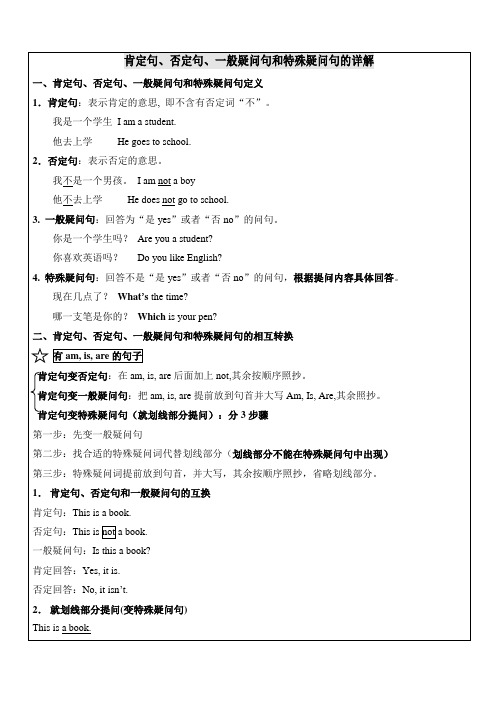
熟记变特殊疑问句时,容易判断错的情况。
1、 数词
表示年龄:He is fifty-five. How old is he ?
表示时间:It’s fifty-five. What’s the time?
表示加法:Six and two is eight. What’s six and two?
表示价格:The shirt is thirty yuan . How much is the shirt?
表示人:She’s Lucy’s sister. Who is she?
练一练 1 (用特殊疑问词填空):
1、A: _______ is the boy in blue?????????B:He’s Mike.
2、A: _______ wallet is it????????????? B:It’s mine.
表示距离:It’s five hundred metres away from here. How far is it from here?
表示长度:It’s five hundred metres. How long is it ?
4、 颜色,东西
表示颜色:The shoes are white. What color are the shoes?
第一步:变一般疑问句 Is this a book? 第二步:找合适的特殊疑问词 Is this what ? 第三步:特殊疑问词提前放到句首,并大写,其余按顺序照抄,省略划线部分。What is this?
没有 am, is, are 的句子
肯定句变否定句:在主语后面加上 do not 或者 does not,其余按顺序照抄动词用原形
2.and 变为 or
小学英语肯否一特四种句型详解及精编练习题精排版!!!
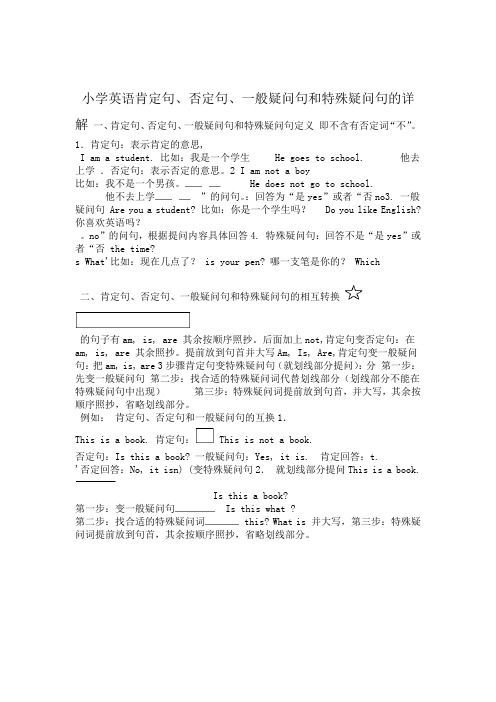
小学英语肯定句、否定句、一般疑问句和特殊疑问句的详解一、肯定句、否定句、一般疑问句和特殊疑问句定义即不含有否定词“不”。
1.肯定句:表示肯定的意思,I am a student. 比如:我是一个学生 He goes to school. 他去上学.否定句:表示否定的意思。
2 I am not a boy比如:我不是一个男孩。
He does not go to school.他不去上学”的问句。
:回答为“是yes”或者“否no3. 一般疑问句 Are you a student? 比如:你是一个学生吗? Do you like English? 你喜欢英语吗?。
no”的问句,根据提问内容具体回答4. 特殊疑问句:回答不是“是yes”或者“否 the time?s What'比如:现在几点了? is your pen? 哪一支笔是你的? Which 二、肯定句、否定句、一般疑问句和特殊疑问句的相互转换的句子有am, is, are 其余按顺序照抄。
后面加上not,肯定句变否定句:在am, is, are 其余照抄。
提前放到句首并大写Am, Is, Are,肯定句变一般疑问句:把am, is, are 3步骤肯定句变特殊疑问句(就划线部分提问):分第一步:先变一般疑问句第二步:找合适的特殊疑问词代替划线部分(划线部分不能在特殊疑问句中出现)第三步:特殊疑问词提前放到句首,并大写,其余按顺序照抄,省略划线部分。
例如:肯定句、否定句和一般疑问句的互换1.This is a book. 肯定句:This is not a book.否定句:Is this a book? 一般疑问句:Yes, it is. 肯定回答:t.'否定回答:No, it isn) (变特殊疑问句2.就划线部分提问This is a book.Is this a book?第一步:变一般疑问句 Is this what ?第二步:找合适的特殊疑问词this? What is 并大写,第三步:特殊疑问词提前放到句首,其余按顺序照抄,省略划线部分。
八种时态句子怎样变一般疑问句和否定句

八种时态句子怎样变否定句和一般疑问句时态是英语中考的一项至关重要的考点,广大初中学生在实际运用时,往往对时态总是倍感棘手,下面我们就对这几种时态句子的否定句和一般疑问句的变形进行一些归纳整理。
一、一般现在时:概念:表示经常、反复发生的动作或行为及现在的某种状况。
基本结构:即谓语动词形式:①be动词原形;②行为动词(原形或“三单”形式)如:1,Iamastudent.2,Theygetupearly.3,Hehelpsus.助动词:does和do方法:1,首先观察句子中的谓语动词是be动词呢还是行为动词(表示具体动作行为的词如:play)2,变一般问句:Be动词的话就把be放到句首,若是行为动词就把do放到句首。
注意当主语为第三人称单数时,用dose放句首,谓语动词要变回原形。
当然别忘句末加问号。
如上面的句子变一般问句分别为:Are youastudent?Do theygetupearly?Does he help us?3,变否定句时,如句中有be动词就在be后加not,若是行为动词就在行为动词前加don't,如主语为第三人称单数,则加doesn't,同时动词变原形。
Iamnotastudent.Theydon'tgetupearly.Hedoesn'thelpus.二、一般过去时:概念:过去某个时间里发生的动作或状态;过去习惯性、经常性的动作、行为。
基本结构:①be动词(was或were);②行为动词(动词过去式)如:1,Hewasastudenttwoyearsago.2,Theycamebacklastnight.助动词:did1,变一般问句时,①把was或were放于句首,谓语动词是行为动词时,就把did放到句首,动词变回原形。
句末加问号。
上例可变为:Was heastudenttwoyearsago?Did they come backlastnight?2,变否定句时,①was/were+not;②在行为动词前加didn't,同时还原行为动词。
初一否定句-一般疑问句和特殊疑问句讲解

肯定句、否定句、一般疑问句和特殊疑问句的详解1.:在am , isnot ,其余按顺序照抄。
例如:。
→ 。
(I am not=I’m not )。
→ (is not= isn't )。
→ 。
(are not= aren ’t )2. 肯定句变一般疑问句:把 am, is, are 提前放到句首并大写 Is , Are,其余照抄,句号变问号。
(Am 变为Are,I 变为you ,We 变为you, My/ Our 变为 your )肯定回答 / 否定回答 例如 → ? —Yes , I am./ No, I ’m not 。
→ Is he a boy? -Yes, he is 。
/ No , he isn ’t 。
cars. → Are they cars ? -Yes , they are 。
/ No,they aren't. We are students 。
→ Are you students? -Yes , we are 。
/ No , we aren ’ 。
→ ?he is 。
/ No , he isn't. 。
→(回答时,原句的某人,王老师,爸爸,简,康康等要用人称代词替换.)—Yes, she is./ No, she isn ’t.→ Is Jane a good student? —Yes , she is./ No, she isn ’t 。
→ Is the dog his ? –Yes, it is./ No , it isn ’t. 3.肯定句变特殊疑问句(就划线部分提问):分3步骤 第一步:先变一般疑问句 第二步:找合适的特殊疑问词代替划线部分 第三步:特殊疑问词提前放到句首,注意:1如: Li Ming 's not here 。
—1.Is Li Ming not here ? —2。
Is who not here ? —3。
小学英语四种基本句型-肯定句、否定句、一般疑问句及特殊疑问句
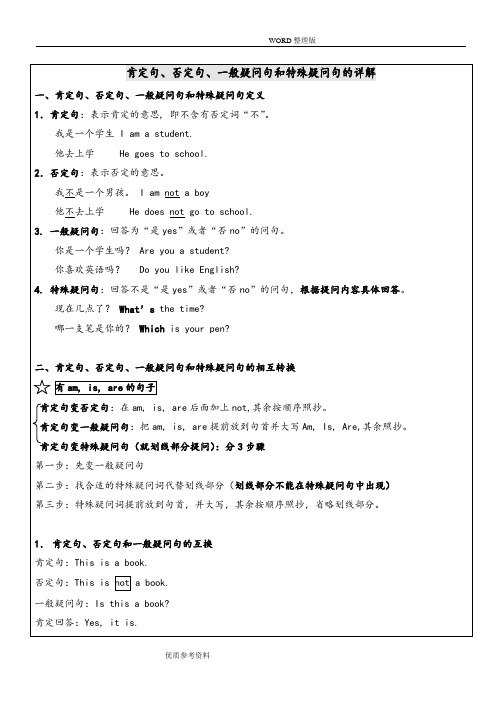
WORD 整理版
常用特殊疑问词及词组:
when 什么时间(问时间)
what date 什么日期 问具体日期
who 谁(问人)
what place 什么地点问具体地址
whose 谁的 问主人
how …怎么样 问情况
where 在哪里 问地点
how old 多大 问年龄
which 哪一个 问选择
how many 多少 问数量
I have been there already.→I haven't been there yet.
熟记变特殊疑问句时,容易判断错的情况。 1、 数词
表示年龄:He is fifty-five. How old is he ? 表示时间:It’s fifty-five. What’s the time? 表示加法:Six and two is eight. What’s six and two? 表示价格:The shirt is thirty yuan . How much is the shirt? 表示多少:I have three brothers. How many brothers do you have? 2、 姓名和人 表示人名:My name is Gina. What’s your name? 表示人:The woman is Gina. Who is the woman ? 3、 长度和距离 表示距离:It’s five hundred metres away from here. How far is it from here? 表示长度:It’s five hundred metres. How long is it ?
B: _______ ?
A: I want to make a kite.
英语否定句和一般疑问句

He isn't Li Shan.
I am not Sam.
I'm not Sam.
She is not Su Hai.
She isn't Su Hai.
语文中: 声调
你吃饭了吗?
你洗手了吗? 你写完作业了吗? 她是苏海吗?
升 调
这是你的笔吗?
吃了或者没 洗了或者没
写完了或者没 是或着不是
是或着不是
Is she Su Hai?
Yes, she is. No, she is not. =No, she isn't.
含有be动词的肯定句如何变一般疑问句呢?
I am Sam. He is Lishan.
She is Su Hai.
Are you Sam? Is he Lishan?
1> be动词要提到句子前面; 2> 肯定句中I要变you; 3> 句号要改问号; 4> 发音时要升调。
It is a frog. It is the letter Oo. He is Li Shan.
I am Sam. She is Su Hai.
肯定句
对于事物,物体,人 表示肯定的句子
It is a frog.
It is not a frog.
It is the letter Oo. It is not the letter Oo.
I am Sam.
I am not Sam.
She is Su Hai.
be
肯定句
She is not Su Hai.
陈述句
be not
对于肯定句表示相反
否定句
意思的句子
含有be动词的肯定句变为否定句时
否定句和疑问句英语

否定句和疑问句英语【篇一:否定句和疑问句英语】一、含有be动词的一般疑问句,通常把be动词调到句首.例如:陈述句:they are in the swimming pool.一般疑问句:are they in the swimming pool?注意:一般疑问句句末要用“?”.二、含有情态动词的一般疑问句(can, may...),把情态动词调到句首.例如:陈述句:he can drive a car.一般疑问句: can he drive a car?三、含有have的一般疑问句,have译为“有”.一般疑问句式有两种形式:1.把have/has调到句首.例如:陈述句:tommy has a computer.一般疑问句:has tommy/he a computer?2.加助动词do/does,第三人称单数用does,其他人称用do.其句型为:do/does + 主语 + have...?例如上句可变为:does tommy have a computer?一般疑问句:以be动词, have/has/do等助动词、can/may等情态动词开头,以yes或no来回答的问句.它的基本结构是:be/have /has/did等助动词(包括情态动词)+主语+谓语(包括表语)+┄?回答常用简略回答.四、句子里没有be动词、助动词、情态动词(am/is/are/was/were/will/can/may/must/could/have/has[有])等,就需要加助动词do, does,(三单)、 did(过去式)来构成疑问句,加上这些助动词后,句子中谓语动词必须用原形.其句型为:do/does/did + 主语 + 动词原形+其它?陈述句:amy speaks english.一般疑问句:does amy speak english?注意:在把肯定句改成否定句或一般疑问句的时候,要注意句中是否有already、some、something、somebody等词,如果有也必须进行改变,already要改成yet,some、something、somebody等分别改成any、anything、anybody等.另外,在改成否定句的时候注意把too改成either,both改成neither,all改成none等.在改成一般疑问句的时候,常常把第一人称i、we改成第二人称you.好了,知道了如何问话之后,我们来了解一下如何回答一般疑问句.首先要有人称的改变.当主语为名词时,在答语中要改成其相应的代词.另外,答语有两种,肯定的回答(用yes)和否定的回答(用no),否定式常用缩写形式.现在还是让我们分句型一一说明.一、一般疑问句含be动词时,用be动词回答,句末用句号.例如:-is mary your sister?-yes, she is. / no, she isn’t.(缩写)二、一般疑问句含有情态动词(can, may, should等)时,用情态动词回答.例如:-may i come in?-yes, you may. / no, you can’t.三、一般疑问句含有have(译为“有”)时,有两种回答方式.1.直接用have/has回答.例如:-have they any pictures?-yes, they have. / no, they haven’t.2.用助动词do/does回答.例如:-does millie smoke?-yes, she does. / no, she doesn’t.四、一般动词的一般疑问句回答时也用助动词.例如:-do the workers live in london?-yes, they do. / no, they don’t.规则:1. 含系动词be的一般疑问句的构成具体地说,就是当陈述句中有am /is / are时,可直接将它们提至主语前,但如遇第一人称,最好将其置换成第二人称。
- 1、下载文档前请自行甄别文档内容的完整性,平台不提供额外的编辑、内容补充、找答案等附加服务。
- 2、"仅部分预览"的文档,不可在线预览部分如存在完整性等问题,可反馈申请退款(可完整预览的文档不适用该条件!)。
- 3、如文档侵犯您的权益,请联系客服反馈,我们会尽快为您处理(人工客服工作时间:9:00-18:30)。
一般疑问句,否定句课题一:一般疑问句general question重点:辨别一般疑问句,掌握一般疑问句语法结构和使用方法。
难点:1.一般疑问句的句子结构。
2.一般疑问句和陈述句之间的转化。
动词时态的变化。
教具准备:教学讲义练习题。
教学过程:1.复习:P17,P32重新朗读课文。
复习单词和语法。
2.提出课题:Does...like...(doing)?Yes,...does./No,...doesn’t.Is/Are...(doing)?Yes,...is/are./No,...isn’t/aren’t.由以上例句总结一下一般疑问句的定义:一般疑问句是疑问句的一种。
它是一般只用yes (是)或no(否)来回答的句子。
朗读一般疑问句时用升调。
3.教学步骤:a.举出更多例句.Eg1. 问句:Is this your pen?肯答:Yes,it is.否答:No,it isn`t.Eg2. 问句:Are these your books?肯答:Yes,they are.否答:No,they aren’t.Eg3. 问句:Can you speak English?肯答:Yes,I can.否答:No,I can’t.Eg4. 问句:Do you like apple?肯答:Yes,I do.否答:No,I don’t.b.总结一下一般疑问的句子结构及回答。
(句子结构的记忆方法:就是讲前面2个词调换位置了。
)Is/Are+主语+其他部分? 。
是。
?Eg1. Is this your pen?当只有一支笔的时候就用Is, 回答:Yes,it is/No,it isn’t .当有两只及以上用时用Are,而且要讲这个(this)/那个(that)变为这些(these)/那些(those).笔要加s变成复数。
如:Are these/those your pens?回答:Yes,they are/No,they aren’t.② Can/Will+主语+V-原型? (后面动词都用原型)Eg. You can open the door→Can you open the door?You will go to school next Monday →Will you go to school next Monday ?③Do/Does+主语+V-原型?Eg. Do you like apple?Does Mary like cat?第一,二人称(I,You)用Do; 第三人称(Mary)用DoesParents等复数也用Do.举例:我需要现在回家吗?Do i need to go home now?回答:你父母喜欢英语吗?Do your parents like English?Alice喜欢花吗?Does Alice like flower?C.辨别以下是否为一般疑问句。
Are you a student?Is it his pet?What is that over there?Can you swim?Do you have a storybook?This is a toy bear,I think.D.将陈述句转化为一般疑问句。
①句子中有Is/Are/can: (some 改成any,my改成your等)一加:把句中的Is/Are/can.到主语前;二改:改换主语称谓,即将句中的主语I\my\mine\we\our\ours等第一人称分别改为相应的第二人称you\your\ yours等;三问号:句末的句号改为问号。
如:Eg6. I am an English teacher. → Are you an English teacher?Eg7. We can speak English fluently. → Can you speak English fluently?②句子中没有Is/Are/can (some 改成any,my改成your等)一加:即在句首加助动词Do或Does;二改:1、把谓语动词改为原形;2、改换主语称谓(同①);三问号:句末的句号改为问号。
Eg8. We read English every morning. → Do you read English every morning?Eg9. Tom’s father listens to English on the radio every evening. →Does Tom’s father listen to English on the radio every evening?特别注意:对于第②一定要注意动词的还原,因为时态与数的变化已经体现在助动词上了。
E.将下面的句子转换为一般疑问句。
1.I am from china. Are you from china?2.This is my sister ,Nancy. Is this your sister,Nancy?3.You can have a look. Can I have a look?4.I play football. Do you play football?5.Kitty has a yellow purse. Does Kitty have a yellow Purse?6.There is a birthday cake on the table? Is there a birthday cake on the table?课题二:一般现在时否定句重点:1.掌握一般现在时否定句的基本构成方法。
2.了解一般现在时否定句的基本用法。
3.能灵活的运用一般现在时的否定句形式。
难点: 1.一般现在时否定句的构成,掌握行为动词一般现在时第三人称单数。
2.能灵活的运用一般现在时否定句。
教学过程:1.Be动词的否定式:be+notEg:I am a teacher. I ‘m not a teacher.You are a student. You aren’t a student.She is a doctor. She isn’t a docor.We are friends. We aren’t friends..要求学生写出类似的句子。
如:I am a girl.2.Do/Does(实义动词)的否定句。
Do+not/Does+not.第一人称(我/我们)、第二人称(你/你们)→Do第三人称(他/他们)→Does 改为否定句时,一定要记得讲句子中动词恢复原型。
Eg. I like English I don’t like English.Mary likes playing the piano Mary doesn’t like playing the piano.注意:球类前一般都不加定冠词.play football踢足球 play baseball打棒球 play tennis 打网球play table tenneis 打乒乓球 Play badminton 打羽毛球乐器前一般都加定冠词.play the guitar 弹吉他 play the violin 拉小提琴 Play the drum 打鼓We go to school by bike. We don't go to school by bike.3.练习一下。
将词组或单词写成一个完整的句子,并改为否定句。
My mother read books every morning.Lily sing song every nightPlay basketball Tom like on weekendsAt the mid-aurumn eat we mooncakes课结束前总结课堂讲义1.否定句:将词组或单词写成一个完整的句子,并改为否定句。
My mother read books every morning.Lily sing song every nightPlay basketball Tom like on weekendsAt the mid-aurumn eat we mooncakes2.一般疑问句:辨别以下是否为一般疑问句。
Are you a student?Is it his pet?What is that over there?Can you swim?Do you have a storybook?This is a toy bear,I think.3.一般疑问句:将下面的句子转换为一般疑问句。
1.I am from china. Are you from china?2.This is my sister ,Nancy. Is this your sister,Nancy?3.You can have a look. Can I have a look?4.I play football. Do you play football?5.Kitty has a yellow purse. Does Kitty have a yellow Purse?6.There is a birthday cake on the table? Is there a birthday cake on the table?HOMEWORK 一般疑问句及否定句专项练习一. 请将下列句子改为一般疑问句,并作出回答。
1. I am a student. ----- ------- a student?2.She is a girl. - ---- ----- a girl?3.His first name is Tom. ------ -------- ------name Tom?4. This is a ruler. ------ ------ a ruler?6. There is a book on the desk. ------ ------- a book on the desk?7.There are some dictionaries on the floor.----- ------- ------ dictionaries on the floor?10. My friend wants to know about my morning.----- ----- ------ ------- to know about------ morning?11.Tony has a computer. ----- Tony------ a computer?12.Mr.White is very busy. ------- Mr.White very busy?13.He teaches us art. ------ ------ --------- us art?14.She watches TV in the morning. ------ ---- ------- TV in the morning?15.I watch TV in the evening. ----- ------ ------- TV in the evening?16.He runs every day. ------- ------ -------- every day?17.I want to know his name. ------ ------- ------- to know his name?18.They study at home. ----- ------- -------- at home?19.She studies English at school. ----- ------- -------- English at school?20.I do my homework every day. ----- ------- ------ ------- homework every day?21.He does his homework at7:00pm. ----- ------ ------ his homework at7:00pm?22.They have five rooms. ------ ------- -------- five rooms?23.She eats chicken for dinner. ------ ----- ------ chicken for dinner?24.My parents like eating bananas. ----- ------- parents------ --------bananas?25. We do eye exercises every day. ----- ------ ----- eye exercises every day?26. He has a green T-shirt. ------ ----- ------- a green T-shirt?27.My birthday is October 10th. ---- ------ -------- October 10th?28.Her favorite subject is science. ----- ----- ------ ------ science?29.We can see some birds. ------- -------see------- birds?二.请将下列句子改为否定句1.There is a computer on the desk. There ------- a computer on the desk.2. There are some pictures on the wall. There ------- ------- pictures on the wall.3.She is seven years old. She ----- ----- seven years old.4. I like pears. I ----- ----- pears.5. She has a soccer ball. She ----- ------ a soccer ball.6. My mother wants to go to a movie. My mother------ ------ to go to a movie.7. Tom can play the drums. Tom------- play the drums.8. I can sing and dance. I ------- sing----- dance.9. She has some erasers. She------ ------ ----- erasers.10.I think it is interesting. I---- ----- it is interesting.11. Mary often plays sports after dinner. Mary----- ----- ----- sports after dinner.12. There are some tomatoes in the box.There are------- ------- tomatoes in the box.13. Tell him the news. ----- ------- him the news.14. She has brothers and sisters. She----- ------ brothers----- sisters.15. I think she is right. I----- ----- she----- right.16.She gets up at 6:00 in the morning. She----- ----- up at 6:00 in the morning.。
